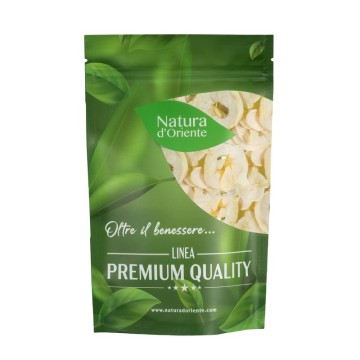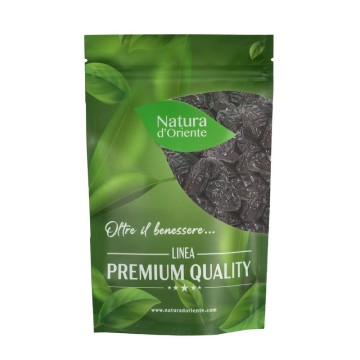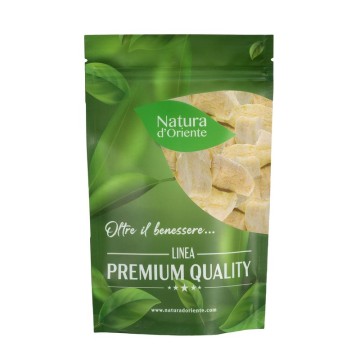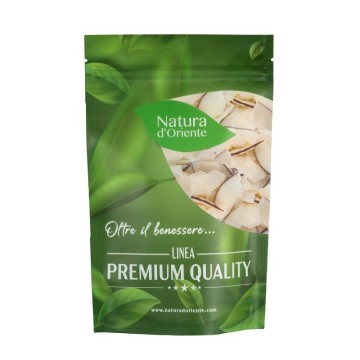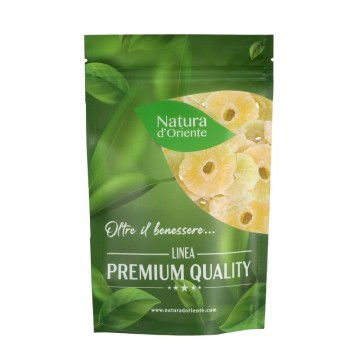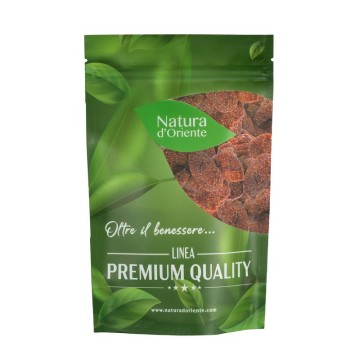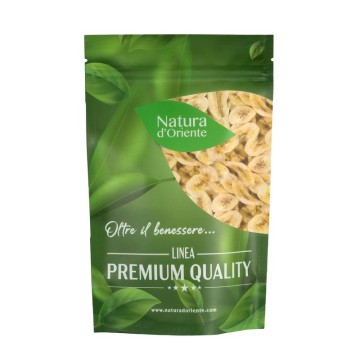This tropical fruit is a citrus fruit known on our tables for its sweet-sour flavour, and for its nutritional properties. The natural version of grapefruit slices allows you to take the original substances, without added sugars, preservatives or colorings. Being dried and concentrated, it gives an intense and sour flavour, perfect as a healthy, slightly sweet snack.
Natural dehydrated grapefruit: properties and benefits
Among the dried fruits, grapefruit provides various nutrients, antioxidants and fibers useful to our body. The drying process maintains various nutrients, favoring the intake of grapefruit in every season - one of the most beneficial citrus fruits.
Its antioxidant function derives from vitamins and minerals, known for their beneficial effects on regular metabolism, and protection from free radicals. In the dehydrated grapefruit version, the nutrients provide potassium, a mineral responsible for many beneficial aspects for the body, as well as magnesium, copper, iron, proteins and fibre.
Like various citrus fruits, dried grapefruit represents a food to include in your balanced diet, given that it is low in calories compared to other dehydrated fruits. Especially in the version without added sugars.
Origins and history of cultivation
The grapefruit derives from a plant that represents a natural hybridization, probably between the sweet orange and the pomelo, which occurred in the Barbados islands centuries ago. Since then, the grapefruit has been a species in its own right, increasingly known on the tables of the islands of the West Indies, and then on the American continent. For a few decades now, grapefruit has become popular as a fruit in various parts of the world and its production has extended to countries that already produce citrus fruits. Today the tree is cultivated for its fruit in Israel, the United States, Cyprus, South Africa and Brazil.
Plant and flowers
The grapefruit comes from the Citrus × paradisi Macfad plant, a fruit tree belonging to the Rutaceae family.
It belongs to the Citrus genus, as already mentioned it is a hybrid between sweet orange (Citrus sinensis) and pomelo (Citrus grandis), and to the species defined as “paradisi”. It is a tree that is considered vigorous, which can grow up to 6 meters and resembles an orange. The large, white flowers bear fruit that is mostly yellow when ripe, while some varieties show equally yellow and tender pulp. The size depends on the grapefruit variety and growing conditions.
Nutritional values of grapefruit
Dried grapefruits make several nutrients available. They are a source of carotenoids, proteins (about 6.3 g / 100 g) and other micronutrients. This sugar-free version does not contain excessive calories for a dehydrated fruit (about 279 per 100 grams). It shows a decent fiber content (about 14.5 g / 100 g), little fat (0.6 per 100 grams). Among the various minerals present, there are potassium, magnesium, and copper.
How to use dehydrated grapefruit in the kitchen
Dehydrated slices have various uses, in particular as energy snacks during the day. Dried grapefruit is great for breakfast, in addition to yogurt, cereals, fresh fruit and granola, in tea blends. Also suitable for mid-morning or mid-afternoon hunger-busting snacks, consumed in slices.
It is used in various sweet or savory recipes, to flavor biscuits, fruit salads, ice cream tops and semifreddos. Dehydrated grapefruit is also an ingredient to dip in chocolate to create tasty bars.
Dehydrated grapefruit is useful as a garnish in cocktails and drinks, highly appreciated by brewers and distillers. Dried grapefruit peel is a great way to add fruit flavor to sweet and savory foods. Furthermore, the sugar-free version of natural dehydrated grapefruit is useful for the preparation of energy bars, dedicated to athletes and those who want to create healthy snacks.
Grapefruit: side effects and contraindications
No particular contraindications to the intake of dehydrated grapefruit fruit have been identified but a possible intolerance to the food must be kept in mind. The correct quantities of fruits must not be exceeded, taken in moderation, otherwise you risk laxative effects, digestive and gastrointestinal disorders. A contraindication of dehydrated fruit concernsto people who are overweight and suffer from diabetes, who should consume it moderately. The presence of concentrated natural carbohydrates and sugars can increase blood sugar levels - even in the case of diabetes due to pregnancy or breastfeeding.
![]()

![Natural dehydrated grapefruit without added sugar [NATURADORIENTE] Natural dehydrated grapefruit without added sugar [NATURADORIENTE]](https://www.naturadoriente.com/10190-large_default/pompelmo-naturale-disidratato-senza-aggiunta-di-zucchero.jpg)
![Natural dehydrated grapefruit without added sugar [NATURADORIENTE] Natural dehydrated grapefruit without added sugar [NATURADORIENTE]](https://www.naturadoriente.com/10191-large_default/pompelmo-naturale-disidratato-senza-aggiunta-di-zucchero.jpg)
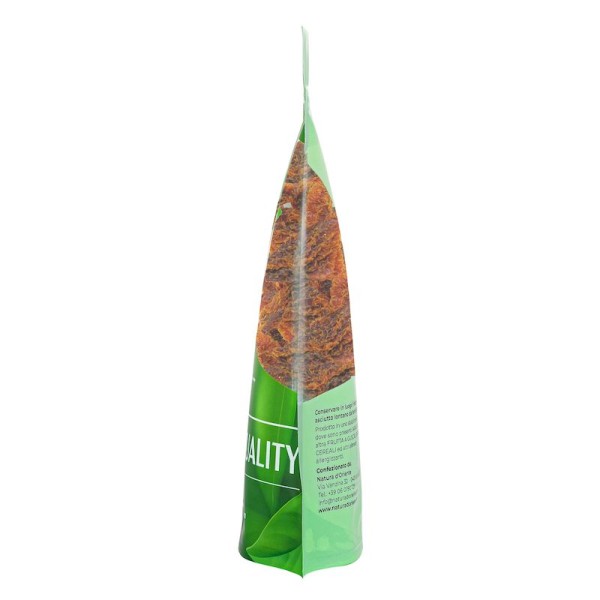
![Natural dehydrated grapefruit without added sugar [NATURADORIENTE] Natural dehydrated grapefruit without added sugar [NATURADORIENTE]](https://www.naturadoriente.com/10057-large_default/pompelmo-naturale-disidratato-senza-aggiunta-di-zucchero.jpg)
![Natural dehydrated grapefruit without added sugar [NATURADORIENTE] Natural dehydrated grapefruit without added sugar [NATURADORIENTE]](https://www.naturadoriente.com/10058-large_default/pompelmo-naturale-disidratato-senza-aggiunta-di-zucchero.jpg)
![Natural dehydrated grapefruit without added sugar [NATURADORIENTE] Natural dehydrated grapefruit without added sugar [NATURADORIENTE]](https://www.naturadoriente.com/10190-home_default/pompelmo-naturale-disidratato-senza-aggiunta-di-zucchero.jpg)
![Natural dehydrated grapefruit without added sugar [NATURADORIENTE] Natural dehydrated grapefruit without added sugar [NATURADORIENTE]](https://www.naturadoriente.com/10191-home_default/pompelmo-naturale-disidratato-senza-aggiunta-di-zucchero.jpg)

![Natural dehydrated grapefruit without added sugar [NATURADORIENTE] Natural dehydrated grapefruit without added sugar [NATURADORIENTE]](https://www.naturadoriente.com/10057-home_default/pompelmo-naturale-disidratato-senza-aggiunta-di-zucchero.jpg)
![Natural dehydrated grapefruit without added sugar [NATURADORIENTE] Natural dehydrated grapefruit without added sugar [NATURADORIENTE]](https://www.naturadoriente.com/10058-home_default/pompelmo-naturale-disidratato-senza-aggiunta-di-zucchero.jpg)
 No reward points for this product.
No reward points for this product.




